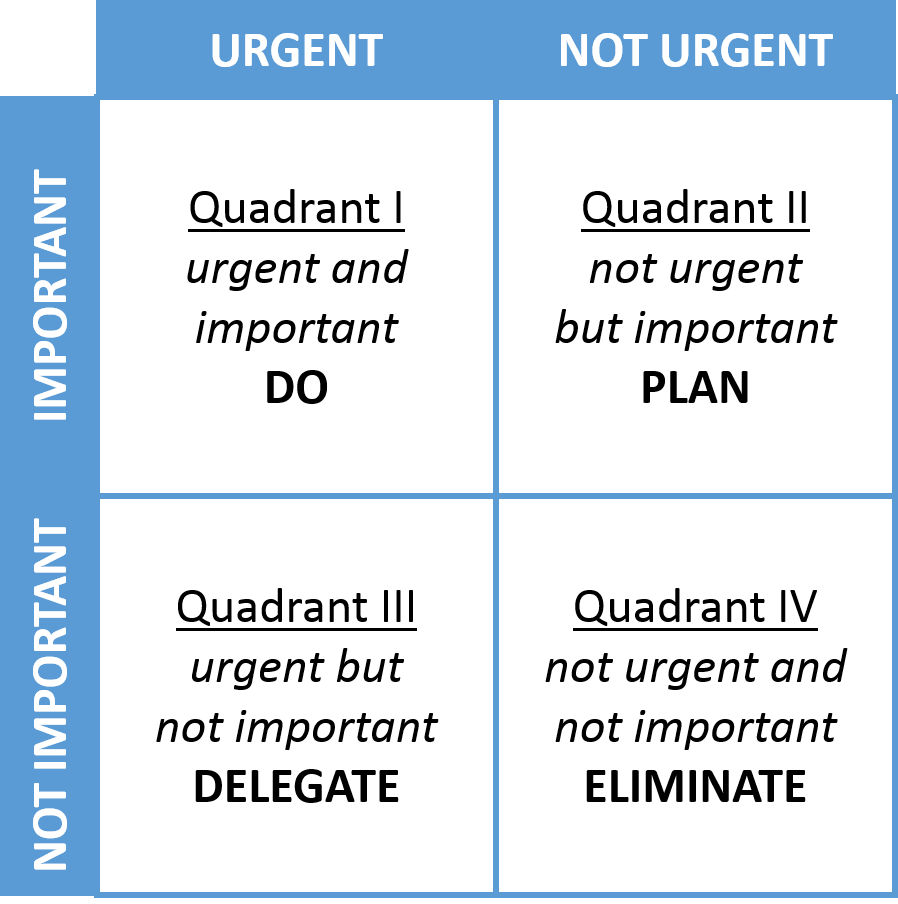Time Management and Prioritization
 photo by anncapictures
photo by anncapictures
Time Management is Critical to Success
The lack of time management and prioritization can bite anyone in the butt, no matter how experienced you are. I know, because this month’s blog almost got away from me for that very reason. It’s been a rough month; my computer went to that great recycling bin in the sky, and I’ve been working with (wait for it…) pen and paper. How antiquated can you get? While that’s not an excuse, it is a fact that I was not very motivated to write a blog in longhand, so I fell way behind in my schedule. The funny thing is that I’ve been working with a client on improving his time management skills. DUH!
Once it dawned on me that I should probably be using the tools I introduced to him, things got a lot easier. It’s not rocket science, it’s forming habits. So today, I’ll share them with you. You probably already know them so consider this month’s blog a gentle reminder – mainly to me because I can go back and read it the next time it feels like my hair is on fire.
Tool #1 – Time management: Use your calendar to keep track of when you need to complete tasks
Use your calendar as a planning tool
- Add events with start and end times [Meet w/ Client 1:00-2:00 on Tuesdays]
- Add tasks that can be crossed off when completed [review training plan next Wednesday]
- Create meetings that you can join directly from the calendar [log on to virtual meeting]
- Chunk your work sessions to give you control over your day
- Block out when you’re busy so you won’t be disturbed
- Schedule work in increments (need 3 hours to work on a proposal? Schedule 3 1-hour long sessions during the week to get it done)
- Lunch
- Use notifications to remind you that things are about to begin
- A 30-minute notification gives you time to close what you’re doing and prepare for what’s next
- A 24-hour notification is a reminder of the next day’s work.
Take the time to learn the functions your calendar provides. It can be a great timesaver and stress reliever.
Tool #2 – Prioritization: Use the Eisenhower Matrix to keep track of what to do first
I learned this a long time ago and on occasion, I pull it out when things get overwhelming. It’s a simple 4 block matrix that helps put things in perspective.
The idea is to identify tasks in terms of urgency and importance. One way to think about it is to remember that urgency means there is a time factor involved. It must meet a deadline. Importance, on the other hand, means there are consequences if it doesn’t get done. It doesn’t matter when it gets done but not doing it causes problems. The Eisenhower Matrix gives you a way to combine the two factors to help you see the most beneficial way to use your time. Take a look:

Davidjcmorris, CC BY-SA 4.0 via Wikimedia Commons
Identifying priorities
What’s the difference between urgent and important? It depends. Here are some things that might fit into the categories
- Priority 1 Urgent and Important: Drop everything and get it done.
- Priority2 Important but Not Urgent: Take the time to schedule what needs to be done and by whom
- Priority 3 Urgent but not important: Delegate the task to someone who has the skills to get it done. This is a great opportunity for team development and training.
- Priority 4 Not Important and Not Urgent: Don’t worry about it. It’s ok if it doesn’t get done
Putting it all together
The key to being better at time management is planning what you need to do and then prioritizing what’s most important. Using the calendar functions presents the big picture and you can look at it in terms of days, weeks, months, or years. Color coding the various items (i.e., meetings in green, healthcare in blue, etc.) lets you see things at a glance. You can also create separate calendars to isolate repetitive events (i.e., sports events, date nights, etc.). An added bonus is that you can share your calendar with other people. The point is you can customize it any way you want. It gives you the information you need to plan your work and work your plan. Once you set it up, the calendar becomes a valued tool.
After you set up your calendar(s) It’s time to use the Eisenhower Matrix. The goal is to identify the things that you: (1) Have to do immediately, (2) Can plan for, and (3) Ignore or do when you have taken care of the other priorities.
Summary
Taking the time to prioritize what you need to do and then scheduling when to get it done is a tremendous benefit. Not only will you be more organized and efficient, but you will also be less stressed and more focused. It’s a win for everyone.
Resources:
https://www.indeed.com/career-advice/career-development/eisenhowers-urgent-vs-important-principle




 Confident Vulnerability
Confident Vulnerability